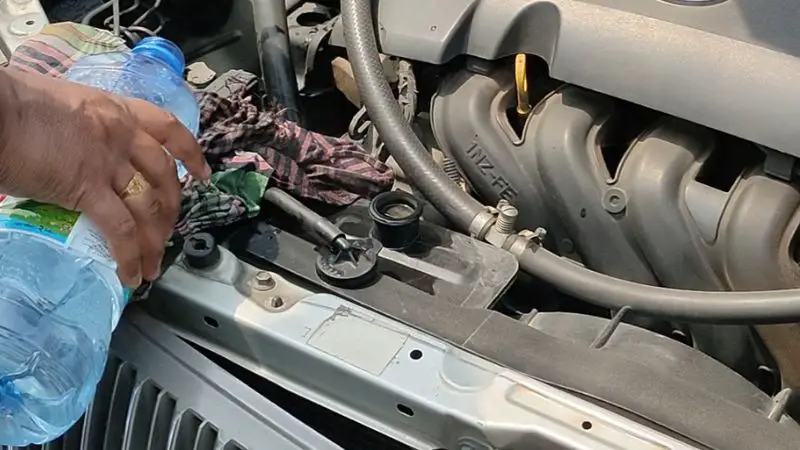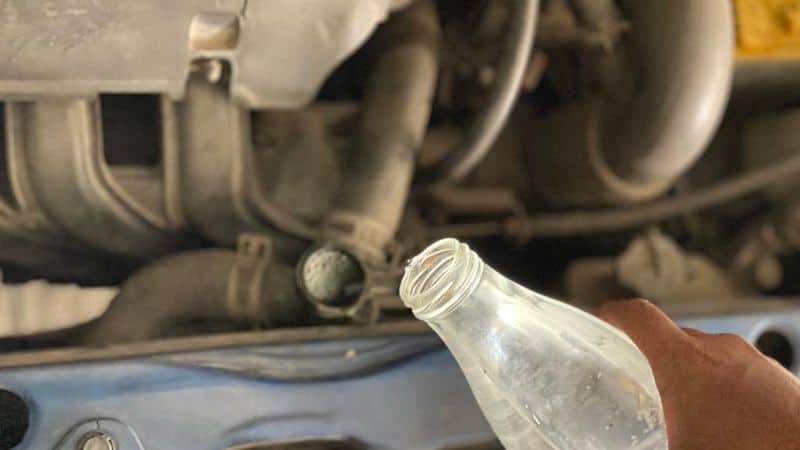Most people ask the question, Can you use water as coolant? This question is asked with such frequency that it is almost the vehicular equivalent of. To give its answer is complex. It’s because, with a yes or no response, you can’t understand the depth. It would help if you were considered in various complexities and nuances.
With water, humans can do many things. But whether it can be used as a coolant is a question that has confused us. After so much research, we came up with an answer to this question which we will discuss here.

How Long Can I Use Water As Coolant?
Although water can help cool your radiator enough to get you to a repair shop or any auto servicing store. But, this is not a long-term solution. So instead, a quick fix will get you to a limited range of about 600 miles or less. Eventually, your cooling system will rust then water can heat up and damage the engine block.
This is especially apparent when driving in a turbulent area. Similarly, water use in cold climates only works for short distances. The reason is that water doesn’t contain anti-freezing properties; It will eventually build up in the engine pipes and cause damage and cracks.
Can You Use Water Instead Of Coolant?
No, normal water or distilled water can overheat your engine. You may end up with a cracked engine block because of thermal expansion. When a vehicle engine is hot, the water inside is also hot, increasing as it heats up. If you regularly put water in an overheated car, this rapid expansion in volume can make the engine block crack.
Without antifreeze, the water passing through your engine’s cooling system can quickly freeze if the temperature drops below 32°F. Using water instead of coolant can seriously damage your car’s engine when it starts again. Rubber hoses will become brittle without coolant, causing fluid leakage. And it can cause your engine to overheat, leading to engine failure.
Can You Use Water As A Coolant?
You can use water in your radiator as a coolant in an emergency. Water alone can only fulfill the task of a coolant if it has a high boiling and freezing point range. And also, it needs the capacity to safeguard your car’s engine. It can only hold the heat somewhat effectively.
Despite the possibility of using water as a coolant, using it only as a last resort is recommended. When you use water as a coolant, you must check your vehicle with a mechanic.
If you drive in scorching places, the water can heat up very quickly. Sometimes you must pull over and turn off the car to let everything cool down. You should not use water in an icy area because it can freeze immediately. The good news is that water can help cool your radiator enough to get you to the repair shop.
But this is an emergency solution, not a long-term solution. Water can eventually rust your cooling system. Moreover, it can increase the heat and crack your engine block. Going to the supply store and buying some coolant immediately is best.
Can You Use Water Instead Of Coolant In Winter?
Technically, you can use water instead of coolant for a short time. But before using water, you should remember the following:
- At sea level, the boiling point of water is 100°C. In addition, the correct coolant level is probably affected by the radiator pressure cap setting.
- Water has no water pump seal lubricant, so expect a short seal life.
- Corrosion – Water contains no corrosion inhibitors.
- The freezing point of water at sea level is 0°C, and suitable coolants are probably lower.
Depending on where you live, short-term consumption will be affected by number 2. Very cold or scorching environments will be affected by 4 and 1.
Can You Use Water Instead Of Coolant In The Summer?
No, you cannot use water in summer. Water can quickly boil and evaporate as the heat rises during the summer. As a result, your car can feel a lack of fluid. However, you should only use the water in an emergency as a last resort.

Can I Use Water As Coolant Temporarily?
Here, the word temporary is essential. It’s because, temporarily, you can use only water as a coolant.
Since a car loses about 60-70% of its energy as heat, you must not use water for an extended period. In particular, since water contains low boiling points, it can quickly begin boiling. That means don’t use water as a coolant in your car for long. If you do it, this can damage your vehicle very quickly. Therefore, water in your car’s radiator can only be in temporarily. And you immediately top up the coolant as soon as you think you can.
Disadvantages of Using Water Instead Of Coolant:
Below are the reasons why you should not use water instead of coolant. Since water has some freezing and boiling temperatures, it begins to boil and evaporate once it reaches the boiling temperature. Hence, this will leave the engine without any fluid to cool itself.
Water freezes at low temperatures, unlike coolant, in icy conditions. Besides this, water hardens & boiled quickly and causes severe damage to the engine and its components. Another problem with using water is that most engine parts are metal, so water can start to erode.
Likewise, water does not prevent the engine from overheating, no matter how much is there. For your information, even a tiny amount of coolant effectively prevents the engine from overheating or freezing. That’s why water use should be avoided except in emergencies.
What Happens if I Use Water Instead Of Coolant?
What happens if plain water is used instead of radiator coolant? You know that heat from internal combustion builds up quickly in hot climates. So it can seriously damage the engine and other parts, such as the cylinder head, head gaskets, etc.
If you use water in these conditions, it will eventually boil and evaporate. Thus it leaves the engine with no coolant. Without this, it can crack radiators, warped cylinder heads, heater cores, and a broken engine clock. Using it excessively will corrode your engine and various metal parts of the vehicle’s cooling system.
Engine Coolant Low Can I Add Water?
If the coolant fluid level is lower than it should be, you can top up your coolant in an emergency. Topping up with water can help you to get to the garage safely. But only depend on it for a short time.
Adding a little water will do no actual harm, but adding too much will lower its boiling point. Yet, it can stop your coolant when working as efficiently.
Final Word:
Now you know the clear answer: “Can you use water as coolant?” Ultimately, water is not the best option for cooling your engine. It can’t act like coolant and can damage your machine if you use it for a long time. After using the water as a coolant, go to the nearest service station to check your engine.
Fortunately, if you have an extra coolant, don’t use any water on your machine. Finally, let us know about your experience, and if you have any questions, please comment with us. Our experts are always ready to answer, and we hope you enjoy this article.
Read Also: How Much Coolant Do I Need For My Car?
